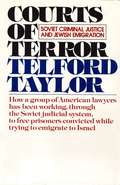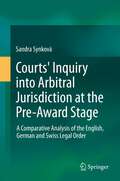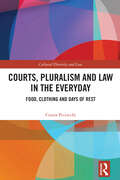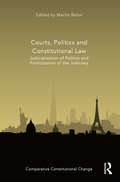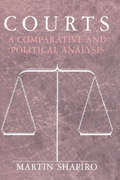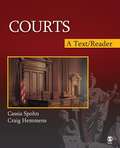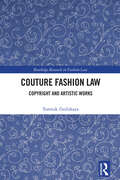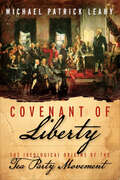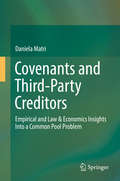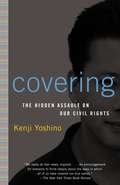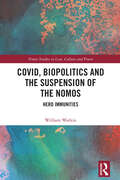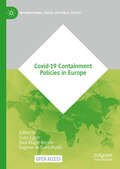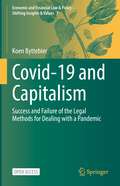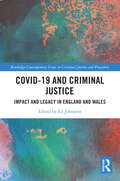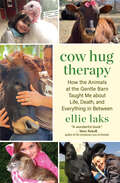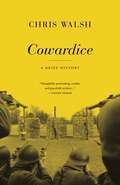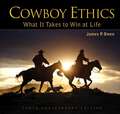- Table View
- List View
Courts of Terror: Soviet Criminal Justice and Jewish Emigration
by Telford Taylor“The true quality of a judicial system is best measured by its resistance to stress, whether caused by community, racial, or other prejudice, or by the pressure of state political policies and interests.” --Telford Taylor Working in secret for the past several years, a group of distinguished American attorneys, including university law professors, has mounted an intensive campaign to secure the release of a score of Russians, most of them Jews attempting to emigrate to Israel, who have been incarcerated in Soviet prisons on a variety of trumped-up charges. Telford Taylor, prosecutor at the Nuremberg war trials and now professor of law at Columbia University, is one of these lawyers. In this book he makes public how he and his colleagues—among them Alan Dershowitz, Leon Lipson, George Fletcher, and Melvin Stein—have challenged the Soviet judicial system on its own legal grounds, and how the Soviet Union has subverted its own rules for the conduct of trials and the confinement of prisoners in order to accommodate a government policy of discouraging emigration without appearing to prohibit it. The author tells how he and his fellow attorneys prepared and presented to Russian officials petitions containing documentation of false indictments and twisted trial procedures. In one case, a factory mechanic, Isaac Shkolnik, accused of spying for the British, was brought to trial—when the British government denied the accusation—on charges of spying for Israel. In another, a carpenter, Pinkhas Pinkhasov, was tried and imprisoned for overpricing his services after his emigration permit had been issued. Taylor discloses how in case after case, trial after trial, charges have been fabricated, defendants have been denied counsel of their choice, and witnesses requested by the defense have been barred from testifying—all in clear defiance of Soviet law. And—perhaps the most appalling of his revelations—he brings to light the shocking abuse of Jewish prisoners in the camps at the hands of ling-time inmates who were sentenced at the end of World War II for Nazi activities and who by virtue of seniority have become trusties with power to discipline the newcomers. As of early 1976, despite the arduous labors of the American attorneys, despite their visits to Moscow to make personal appeals to Soviet officials (highlighted in Taylor’s account of his dramatic meeting with Roman Rudenko, now the Kremlin’s Procurator General, who served with him as a prosecutor at Nuremberg thirty years ago), only two of the prisoners had achieved early release in possibly unrelated actions. Courts of Terror documents with stinging force how a judicial system can be—and has been—perverted to serve the political purposes of totalitarian state. It is published to set forth the facts, and in hope of opening up new ways to action on behalf of the men who are still unjustly held prisoner.
Courts without Borders
by Tonya L. PutnamCourts without Borders is the first book to examine the politics of judicial extraterritoriality, with a focus on the world's chief practitioner: the United States. For much of the post-World War II era, the United States has been a frequent yet selective regulator of activities outside its territory, and US federal courts are often on the front line in deciding the extraterritorial reach of US law. At stake in these jurisdiction battles is the ability to bring the regulatory power of the United States to bear on transnational disputes in ways that other states frequently dislike both in principle and in practice. This volume proposes a general theory of domestic court behavior to explain variation in extraterritorial enforcement of US law, emphasizing how the strategic behavior of private actors is important to mobilizing courts and in directing their activities.
Courts' Inquiry into Arbitral Jurisdiction at the Pre-Award Stage: A Comparative Analysis of the English, German and Swiss Legal Order
by Sandra SynkováInternational arbitration has become the favored method of resolving disputes between business partners in almost every aspect of international trade, commerce, and investment. The resolution of a dispute by means of international arbitration provides the parties with an opportunity to resolve their disputes in a private, confidential, cost and time efficient manner before a neutral tribunal of their choice. However, challenges to arbitral jurisdiction have become a common practice in the field. Resolution of such challenges may significantly delay the resolution of the parties' primary substantive dispute, increase overall dispute resolution costs and even whittle down the benefits of the parties' bargain to arbitrate. Accordingly, adopting a proper approach to the resolution of such disputes becomes crucial to the efficacy of international arbitration as a system of dispute resolution. The present book provides a comparative analysis of the practice of three carefully selected legal orders: the English, German and Swiss and outlines possible ways forward. As the work strikes a balance between theory and practice, it will appeal to practitioners, researchers, but also students looking to develop their understanding of the international arbitration field.
Courts, Law, and Politics in Comparative Perspective
by Herbert Jacob Erhard Blankenburg Herbert M. Krizter Doris Marie Provine Joseph SandersComparisons of the legal systems in England, Germany, France, Japan, and the United States.
Courts, Pluralism and Law in the Everyday: Food, Clothing and Days of Rest (Cultural Diversity and Law)
by Cinzia PiciocchiThis book examines the everyday judicial experience in four multicultural jurisdictions as a means of exploring the relationship between legal systems and cultural identities. Increasing social heterogeneity has deeply affected legal systems as courts and parliaments must now deal with a growing rate of cases concerning cultural pluralism. Headline-grabbing disputes usually concern challenges to fundamental rights and principles which may be put at risk by some religious or cultural practices. These are difficult issues questioning the compatibility between some cultural and religious practices and constitutional values. However, much of the interaction between law and cultural pluralism also concerns daily life activities, which do not necessarily challenge fundamental rights. This book deals with food, clothing and days of rest: three expressions of both human needs and identity which are based on ethnic origin, tradition, culture, religion or, simply, taste. The volume looks at the intersection between these choices and constitutional rights such as religious liberty or freedom of expression. It aims to understand how the state legal system deals with them and when non-mainstreaming behaviours are accommodated. Four legal systems are taken into consideration – the United States of America, Canada, France and Italy – exploring similarities and differences in facing cultural diversity around these quotidian issues. The book pays particular attention to the places where diversity is most apparent and also considers the choices that are not based on religious precepts, but rather on “personal philosophy”. The book will be of interest to researchers, academics and policy-makers working in the areas of constitutional law, law and cultural diversity, human rights, minority rights and discrimination law.
Courts, Politics and Constitutional Law: Judicialization of Politics and Politicization of the Judiciary (Comparative Constitutional Change)
by Edited by Martin BelovThis book examines how the judicialization of politics, and the politicization of courts, affect representative democracy, rule of law, and separation of powers. This volume critically assesses the phenomena of judicialization of politics and politicization of the judiciary. It explores the rising impact of courts on key constitutional principles, such as democracy and separation of powers, which is paralleled by increasing criticism of this influence from both liberal and illiberal perspectives. The book also addresses the challenges to rule of law as a principle, preconditioned on independent and powerful courts, which are triggered by both democratic backsliding and the mushrooming of populist constitutionalism and illiberal constitutional regimes. Presenting a wide range of case studies, the book will be a valuable resource for students and academics in constitutional law and political science seeking to understand the increasingly complex relationships between the judiciary, executive and legislature.
Courts: A Comparative and Political Analysis
by Martin ShapiroIn this provocative work, Martin Shapiro proposes an original model for the study of courts, one that emphasizes the different modes of decision making and the multiple political roles that characterize the functioning of courts in different political systems.
Courts: A Comparative and Political Analysis
by Martin ShapiroIn this provocative work, Martin Shapiro proposes an original model for the study of courts, one that emphasizes the different modes of decision making and the multiple political roles that characterize the functioning of courts in different political systems.
Courts: A Text Reader (Sage Text/Reader Series in Criminology and Criminal Justice)
by Cassia Spohn Craig T. Hemmens Wesley S. McCannThis book provides more in the way of text and pedagogy and uses recent research-based articles to help students understand courts. This book is unique in that it is a hybrid text/ reader offering the best of both worlds. It includes a collection of articles on courts that have previously appeared in a number of leading criminal justice/criminology journals along with original textual material that explains and synthesizes the readings. Some of the best recent research are selected and assembled in this text/reader for an undergraduate or graduate courts class.
Courts: A Text/Reader
by Cassia Spohn Craig HemmensIntended for graduate and undergraduate study of the judicial system, this textbook on the United States criminal court system provides an overview of the processes, research principles and classic case studies that define this institution. Spohn (criminology and criminal justice, Arizona State U.) and Hemmens (criminal justice, Boise State U.) have made the text for accessible for students who are not necessarily studying law, and they include discussion questions, readings and exercises that focus more on the practical aspects of courts and less upon legal theory. An online site provides additional Internet resources for students, and instructors can order an additional CD-ROM that contains a test bank, PowerPoint slides and classroom activities. Annotation ©2009 Book News, Inc., Portland, OR (booknews.com)
Couture Fashion Law: Copyright and Artistic Works (Routledge Research in Fashion Law)
by Tomruk ŰstűnkayaThis book provides an insight into the legal workings of the most ostentatious fashion sector, Couture, whilst simultaneously advocating for stronger legal protection in this industry.Offering an interdisciplinary approach, including art theory from Tolstoy and Rand amongst others, the book examines where Couture fashion sits within the law. Most significantly the book considers the couturier as an ‘artist’ and Couture as ‘art’ in relation to how this art form may be protected legally by copyright. Reflecting on contemporary issues, it analyses recent legal cases together with legislation, to provide awareness on the current position, and considers implications for the future by suggesting legal frameworks in pursuit of improvements. Using U.K. law as a case study, the book also comparatively assesses global fashion law, analysing the legal workings in the E.U. and the U.S.The book will be of interest to researchers in the field of fashion law, copyright law, art, and intellectual property.
Covenant of Liberty: The Ideological Origins of the Tea Party Movement
by Michael Patrick LeahyToday's Tea Party activists are motivated by the same ideological desires as our nation's Founding Fathers, argues Michael Patrick Leahy in this illuminating work of political history.Today's political class—in both parties and at all levels of government—shows a blatant disregard for both the letter and spirit of the U.S. Constitution. More and more Americans are fed up, and from this sweeping sense of discontent and anger the Tea Party movement has emerged, revitalizing the spirit of constitutionalist activism in the conservative world.According to author and Tea Party activist Michael Patrick Leahy, a similar lack of accountability ignited our nation's Founding Fathers, and they were motivated by the same ideological desires: to constitutionally limit government, ensure fiscal responsibility, and defend individual liberty. These imperatives were at the heart of what he calls a "covenant of liberty," which undergirds our written Constitution. Leahy traces these ideas to the libertarian traditions of the English Civil War. He explains why they were on the minds of Americans at the birth of the republic, and how they passed down largely intact from generation to generation, were broken by a corrupted political class, and have been rediscovered by the modern Tea Party movement.According to Leahy, the American constitutional covenant consists of four unwritten promises that most citizens continue to regard as crucial to our government's legitimacy. The story of how this covenant evolved and how its fundamental promises were broken forms the core of this unique and original work of political history.As Leahy shows, the first promise—to abide by the written words of the Constitution—was broken before the ink was dry on the nation's founding documents. The second—to refrain from interfering in private economic matters—was broken by the Republican Party in the 1860s. The third—to honor the customs, traditions, and principles that made up the "fiscal constitution"—was broken by Herbert Hoover 143 years after the establishment of our republic, a sad rupture conducted on an even grander scale by his successors, beginning with Franklin Roosevelt and continuing through the administration of Barack Obama.The breaking of these promises greatly accelerated the natural tendency of governments to centralize and consolidate power at the expense of individual liberty. Had not the fourth and final promise—that members of the legislative branch would exercise thoughtful deliberation while giving respectful consideration to the views of their constituents—been broken in such a disdainful and audacious manner in early 2009, the grassroots activists who came to make up the Tea Party would never have been impelled to take action.Drawing on his personal experience as the organizer of the online conservative community that launched the Tea Party movement in February 2009, Leahy documents how the timeless principles of American constitutionalism have been used to grow one of the most active and influential movements in American history.
Covenants and Third-Party Creditors: Empirical and Law & Economics Insights Into a Common Pool Problem
by Daniela MatriThis book adds to the debate on the effects of covenants on third-party creditors (externalities), which have recently become a focus of discussion in the contexts of bankruptcy law, corporate law and corporate governance. The general thrust of the debate is that negative effects on third-party creditors predominate because banks act in their own self-interest. After systematising the debated potential positive and negative externalities of covenants, the book empirically examines these externalities: It investigates the banks' factual conduct and its effects on third-party creditors in Germany and the US. The study's most significant outcome is that it disproves the assumption that banks disregard third-party creditors' interests. These findings are then interpreted with the tools of economic analysis; particularly, with the concept of common pool resources (CPRs). Around the aggregated value of the debtor company's asset pool (as CPR) exists an n-person prisoner's dilemma between banks and third-party creditors: No creditor knows when and under what conditions the other creditor will appropriate funds from the debtor company's asset pool. This coordination problem is traditionally addressed by means of bankruptcy law and collaterals. However, the incentive structure that surrounds the bilateral private governance system created by covenants and an event of default clause (a CPR private governance system) is found to also be capable of tackling this problem. Moreover, the interaction between the different regulation spheres - bankruptcy law, collateral and the CPR private governance system − has important implications for both the aforementioned discussions as well as the legal treatment of covenants and event of default clauses. Covenants alone cannot be seen as an alternative to institutional regulation; the complete CPR private governance system and its interaction with institutional regulation must also be taken into consideration. In addition, their function must first find more acceptance and respect in the legal treatment of covenants and event of default clauses: The CPR private governance system fills a gap in the regulation of the tragedy of the commons by bankruptcy law and collateral. This has particularly important implications for the German #65533; 138 BGB, #65533; 826 BGB and ad hoc duties to disclose insider information.
Covering the United States Supreme Court in the Digital Age
by Richard DavisThe U. S. Supreme Court seeks to withhold information about its deliberations, while the press's job is to report and disseminate this information. These two objectives conflict and create tension between the justices and the reporters who cover them; add to that the increasing demands for transparency in the digital age and the result is an interesting dynamic between an institution that seeks to preserve its opaqueness and a press corps that demands greater transparency. This volume examines the relationship between justices and the press through chapters that discuss facets such as coverage of the institution, the media's approach to the docket, and the effects of news coverage on public opinion. Additionally, two journalists who cover the court offer insights into the profession of reporting today, while two biographers of Supreme Court justices share the perspectives of those justices regarding the press.
Covering: The Hidden Assault on Our Civil Rights
by Kenji YoshinoIn this remarkable and elegant work, acclaimed Yale Law School professor Kenji Yoshino fuses legal manifesto and poetic memoir to call for a redefinition of civil rights in our law and culture. Everyone covers. To cover is to downplay a disfavored trait so as to blend into the mainstream. Because all of us possess stigmatized attributes, we all encounter pressure to cover in our daily lives. Given its pervasiveness, we may experience this pressure to be a simple fact of social life. Against conventional understanding, Kenji Yoshino argues that the demand to cover can pose a hidden threat to our civil rights. Though we have come to some consensus against penalizing people for differences based on race, sex, sexual orientation, religion, and disability, we still routinely deny equal treatment to people who refuse to downplay differences along these lines. Racial minorities are pressed to "act white" by changing their names, languages, or cultural practices. Women are told to "play like men" at work. Gays are asked not to engage in public displays of same-sex affection. The devout are instructed to minimize expressions of faith, and individuals with disabilities are urged to conceal the paraphernalia that permit them to function. In a wide-ranging analysis, Yoshino demonstrates that American civil rights law has generally ignored the threat posed by these covering demands. With passion and rigor, he shows that the work of civil rights will not be complete until it attends to the harms of coerced conformity. At the same time, Yoshino is responsive to the American exasperation with identity politics, which often seems like an endless parade of groups asking for state and social solicitude. He observes that the ubiquity of the covering demand provides an opportunity to lift civil rights into a higher, more universal register. Since we all experience the covering demand, we can all make common cause around a new civil rights paradigm based on our desire for authenticity-a desire that brings us together rather than driving us apart. Yoshino's argument draws deeply on his personal experiences as a gay Asian American. He follows the Romantics in his belief that if a human life is described with enough particularity, the universal will speak through it. The result is a work that combines one of the most moving memoirs written in years with a landmark manifesto on the civil rights of the future. iven us an important, compelling new way to understand civil rights law, a major accomplishment in itself, but with great bravery and honesty, he has forged his argument from the cauldron of his own experience. In clear, lyrical prose, Covering quite literally brings the law to life. The result is a book about our public and private selves as convincing to the spirit as it is to the mind." -Adam Haslett, author of You Are Not A Stranger Here"Kenji Yoshino's work is often moving and always clarifying. Covering elaborates an original, arresting account of identity and authenticity in American culture."-Anthony Appiah, author of The Ethics of Identity and Laurance S. Rockefeller University Professor Of Philosophy at Princeton University "This stunning book introduces three faces of the remarkable Kenji Yoshino: a writer of poetic beauty; a soul of rare reflectivity and decency; and a brilliant lawyer and scholar, passionately committed to uncovering human rights. Like W.E.B. DuBois's The Souls of Black Folk and Betty Friedan's The Feminine Mystique, this book fearlessly blends gripping narrative with insightful analysis to further the cause of human emancipation. And like those classics, it should explode into America's consciousness."-Harold Hongju Koh Dean, Yale Law School and former Assistant Secretary of State for Human Rights"Covering is a magnificent work - so eloquently and powerfully written I literally could not put it down. Sweeping in breadth, brilliantly argued, and filled with insight, humor, and erudition, it offers a fundamentally new perspective on civil rights and discrimination law. This extr...
Covid, Biopolitics and the Suspension of the Nomos: Herd Immunities (Nomos Studies in Law, Culture and Power)
by William WatkinThis book considers how, during the unprecedented global lockdown due to the Covid-19 pandemic, the normal order of everyday life, of the rule of law, of power itself was interrupted, and hence the nomos of this earth was suspended.Employing the term ‘herd immunity’ from vaccination science and global lockdown policy as a guiding theme, the book considers two central aspects of the pandemic. These are the function of herding and collecting as a definition of ontology after Alain Badiou, and the concept of immunity as a suspension of oppositional differences in the work of Roberto Esposito. It then considers how herd immunity not only disrupts the nomos but also suspends its significance as a guiding principle of state-sanctioned legal norms—and perhaps permanently. Providing critical readings of masking, social distancing, compliance, vulnerability, bubbles, immunity, breathing, anti-vaxxers, nudge theory, cocooning, lockdown, patient zero, and the many other terms that became commonplace between 2020 and 2022, the book traces a suspension of legal and social norms, a manipulation of our compliance using false science, and a reconfiguring of the social nomos, in light of the threats of the virus. In a highly original mix of contemporary and post-war continental philosophy, biopolitical theory, set theoretical mathematics, extensional logic, and the most up-to-date science in the area, it argues that lockdown was not some global, biopolitical power grab, but actually a weakening of power, of nomos.This book will appeal to scholars and others in a range of disciplinary areas with interests in the legacy of Covid; but especially those working in the areas of continental philosophy, contemporary legal theory, and biopolitics.
Covid-19 Containment Policies in Europe (International Series on Public Policy)
by Clara Egger Raul Magni-Berton Eugénie de Saint-PhalleThis open access book examines the diverse strategies implemented by national and local European governments to contain the Covid-19 pandemic. Rather than focus on individual national case studies, it brings together leading scholars and policymakers to analyse the wide range of containment policies utilised across the continent at various levels of government. In doing so, the volume assesses Covid-19 crisis-management experiences to identify good practices based on comparative and fine-grained evidence. It argues that such a stock-taking exercise is crucial to better prepare European polities and societies for future crises, including climate change and environmental disasters. The book will appeal to scholars and students of public policy, crisis-management, public administration, international relations and comparative law.
Covid-19 and Capitalism: Success and Failure of the Legal Methods for Dealing with a Pandemic (Economic and Financial Law & Policy – Shifting Insights & Values #7)
by Koen ByttebierThis open access book provides a comprehensive analysis of the socioeconomic determinants of Covid-19. From the end of 2019 until presently, the world has been ravaged by the Covid-19 pandemic. Although the cause of this is (obviously) a virus, the extent to which this virus spread, and therefore the number of infections and deaths, was largely determined by socio-economic factors. From this, it follows that the course of the pandemic varies greatly from one country to another. This observation applies both to countries’ resilience to such a pandemic (which is mainly rooted in the period preceding the outbreak of the virus) and to the way in which countries have reacted to the virus (including the political choices on how to respond). Meanwhile, research has made it clear that the nature of this response (e.g., elimination policy, mitigation policy, and proceeding herd immunity) was, on the one hand, strongly determined by political and ideological factors and, on the other hand, was highly influential in the factors of success or failure in combating the pandemic.The book focuses on the situation in a number of Western regions (notably the USA, the UK, and the EU and its Member States). The author addresses the reasons why in many Western countries both pandemic prevention and response policies to Covid-19 have failed. The book concludes with recommendations concerning the rearrangement of the socio-economic order that could increase the resilience of (Western) societies against such pandemics.
Covid-19 and Criminal Justice: Impact and Legacy in England and Wales (Routledge Contemporary Issues in Criminal Justice and Procedure)
by Ed JohnstonThis collection presents a unique and diverse range of contributions on challenges faced by criminal justice in England and Wales in the wake of the Covid-19 global pandemic. The book brings together leading experts to examine the impact of the pandemic on policing and criminal procedure, prisons and the post-conviction stage of the system. The work further explores the lessons that may be learned and explores the relevance of these lessons for the wider criminal justice system. The reader will gain substantial insight into contemporary challenges in these areas, through original analysis and argument. The experience of England and Wales during the pandemic will also be of interest to the wider international community who will have encountered many of the issues raised in this collection. The book will be essential reading for researchers, academics and policy-makers involved in criminal justice.
Covid-19 and Insurance (AIDA Europe Research Series on Insurance Law and Regulation #7)
by María Luisa Muñoz Paredes Anna TarasiukThis book offers a novel study on the impact of the Covid-19 pandemic on insurance from an international and comparative perspective. It assesses how insurance has to adapt to a new landscape, the effects of which will last over time and cut across all areas of the field. To avoid physical contact, digitalisation has accelerated dramatically, affecting insurance in all its phases: risk selection, underwriting, pricing and claims settlement. However, the effects of the Covid-19 pandemic go far beyond that. The extent to which a claim caused directly or indirectly by the virus is or is not covered by a given policy has been the subject of debate in many insurance branches. The most litigated cases worldwide are those that concern damages resulting from business interruption due to restrictions enforced by the authorities in virtually every country. This book analyses the rulings (for and against the insured) that have already been handed down by courts in various jurisdictions (for example in the US, Latin America, Spain and Germany), in order to provide guidance to the parties in future lawsuits and also to guide the courts’ own responses. This analysis extends to the measures that governments have taken in relation to insurance during the pandemic, as well as the changes that insurers have introduced in their general conditions to exclude coverage for the pandemic. This response is unsatisfactory, as the big question is how pandemic-related risks can be covered if private insurers simply refuse to do so. Solutions based on risk sharing with public entities or the use of contractual modalities such as parametric insurance are among those outlined by the authors. The book was written by experts from academia and lawyers specialising in this field, and written for all those interested in the field of insurance: lawyers, judges, academics and legal professionals.
Covid-19, State-Power and Society in Europe: Focus on Western Balkans (European Union and its Neighbours in a Globalized World #5)
by Neven AndjelicThis book explores the current state of society in Europe in general and the regimes and societies of the Western Balkans in particular. The pandemic and near-universal lockdown have provided an ideal cut-off date for the collection of indices from reputable academic sources that cover the nature of these regimes, individual human freedoms, economic freedoms, the rule of law, human rights and media freedoms. The aggregated findings from the 20 individual indices provide comprehensive data to support original findings and the characterisation of societies in 45 European states. Admittedly, there are differences in the methodologies and samples among the indices consulted. Nonetheless, taken together they offer a solid basis for developing arguments concerning the diversity of regimes, governance and societies in Europe and drawing well-founded conclusions on the nature of society in various parts of Europe. Though the book’s main focus is on the Western Balkans, the region is put in a pan-European context. The issues of migration, minorities, global geopolitics, the crisis of liberal democracy – they all play into developments that are specific to the Western Balkans. The book answers the question of whether the pandemic has allowed local regimes to strengthen their power and exert greater control over society, making it possible to formulate arguments regarding the future of Europe and its integrative processes. In closing, the book investigates Western Balkan regimes’ reactions to the pandemic in the context of governance, society and state power, before addressing the question of whether the future of the Western Balkans lies in the “liberal club”, or whether local hybrid regimes will become even more influential in the near future.
Cow Hug Therapy: How the Animals at the Gentle Barn Taught Me about Life, Death, and Everything in Between
by Ellie LaksThe inspirational story of the compassionate and wise animals of the Gentle Barn and how they became a therapeutic salve for countless guests — and mentors for all of us in how to live and die In Cow Hug Therapy, Ellie Laks recounts the extraordinary journey that started with her first teacher, Buddha — not the religious figure, but a rescued miniature Hereford cow. One evening Buddha wrapped her neck around an exhausted and upset Ellie and transferred a singular form of healing and comfort with an incredible impact. Understanding that this was something to be shared with others, Ellie developed Cow Hug Therapy, a groundbreaking approach to emotional healing that has proved effective for trauma, illness, disabilities, addiction, grief, and stress. This colorful and compelling narrative introduces the healing mavens of the barnyard, each with a unique story of being rescued from trauma and treated with love and respect. In their new role at Ellie’s Gentle Barn sanctuaries, these animals have transformed lives and ignited breakthroughs and newfound purpose for visitors including a young mother who lost her baby, a suicidal teenager, a wounded serviceman, an open-heart-surgery patient, and many more. A testament to empathy and the mission to heal animals, people, and the planet, Cow Hug Therapy serves as a beacon of hope for all seeking healing and connection.
Cowardice: A Brief History
by Chris WalshA provocative look at how cowardice has been understood from ancient times to the presentCoward. It's a grave insult, likely to provoke anger, shame, even violence. But what exactly is cowardice? When terrorists are called cowards, does it mean the same as when the term is applied to soldiers? And what, if anything, does cowardice have to do with the rest of us? Bringing together sources from court-martial cases to literary and film classics such as Dante's Inferno, The Red Badge of Courage, and The Thin Red Line, Cowardice recounts the great harm that both cowards and the fear of seeming cowardly have done, and traces the idea of cowardice’s power to its evolutionary roots. But Chris Walsh also shows that this power has faded, most dramatically on the battlefield. Misconduct that earlier might have been punished as cowardice has more recently often been treated medically, as an adverse reaction to trauma, and Walsh explores a parallel therapeutic shift that reaches beyond war, into the realms of politics, crime, philosophy, religion, and love.Yet, as Walsh indicates, the therapeutic has not altogether triumphed—contempt for cowardice endures, and he argues that such contempt can be a good thing. Courage attracts much more of our attention, but rigorously understanding cowardice may be more morally useful, for it requires us to think critically about our duties and our fears, and it helps us to act ethically when fear and duty conflict.Richly illustrated and filled with fascinating stories and insights, Cowardice is the first sustained analysis of a neglected but profound and pervasive feature of human experience.
Cowboy Christians
by Marie W. DallamCowboy Christians examines the long history of cowboy Christianity in the American West, with a focus on the present-day cowboy church movement. Based on five years of historical and sociological fieldwork in cowboy Christian communities, this book draws on interviews with leaders of cowboy churches, traveling rodeo ministries, and chaplains who serve horse racing and bull riding communities, along with the author's first-hand experiences as a participant observer. <P><P> Marie W. Dallam traces cowboy Christianity from the postbellum period into the twenty-first century, looking at religious life among cowboys on the range as well as its representation in popular imagery and the media. She examines the structure, theology, and perpetuation of the modern cowboy church, and speculates on future challenges the institution may face, such as the relegation of women to subordinate participant roles at a time of increasing gender equality in the larger society. She also explores the cowboy Christian proclivity for blending the secular and the sacred in leisure environments like arenas, racetracks, and rodeos. Dallam locates the modern cowboy church as a descendant of the muscular Christianity movement, the Jesus movement, and new paradigm church methodology. Cowboy Christians establishes the religious significance of the cowboy church movement, particularly relative to twenty-first-century evangelical Protestantism, and contributes to a deeper understanding of the unique Christianity of the American West.
Cowboy Ethics: What It Takes to Win at Life
by James P. OwenA new approach to business ethics is quietly taking hold in executive suites and corporate boardrooms across America. Frustrated by an epidemic of misbehavior at all employee levels, management teams are getting back to basics-back to the idea that personal character and individual responsibility are the ultimate keys to integrity, just as they were back in the days of the Open Range.A decade ago, the book Cowboy Ethics first inspired businesspeople to look to the Code of the West. Once they did, they discovered that its simple, common-sense principles can be more effective guides to business leadership than a truckload of corporate mission statements, rules, and ethics manuals. "Cowboys are role models because they live by a code," says author James P. Owen. "They show us what it means to stand for something, and to strive every day to make your actions line up with your beliefs. And isn't that as good a definition of integrity as you can find?" In the years since, the book's "Ten Principles to Live By" have been embraced by scores of companies, universities, and even a state government. This updated Tenth Anniversary hardcover edition traces the evolution of this grassroots business movement in brand-new chapters while preserving the inspirational lessons and stunning photography of the original. It's ideal for corporate gifts, the new graduate, business students, or any career person who cares about doing the right thing.
